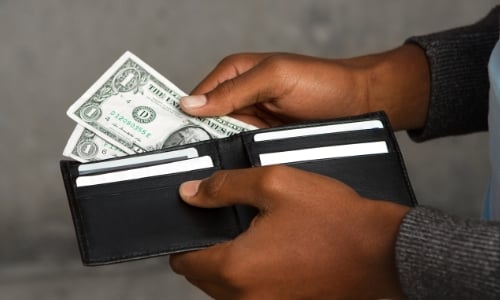
It's no secret that paying off debt takes time. You need to carefully budget your income to make sure you are able to pay for necessities today, while also paying off loans or credit cards. Sometimes this slow process might seem like it's too drawn out.
One way to help with the feeling of frustration that comes when it seems like a payment plan isn't making much progress is to have a no-spend month.
A no-spend month is a full 30 days during which you don't spend any money. Of course, there are some things you'll still have to pay for during this month, such as rent, utilities and gas. But beyond that, you will limit your spending to only necessary items. It will be challenging, but at the end of the month, you'll be able to put a much larger payment toward your debt. Here are some ways you can get ready for a no-spend month:
Grocery Shopping
During a fiscal fast, you'll be cutting out a lot of your normal expenditures. This includes your normal weekly trip to the grocery store. You can still buy necessary items, but try to instead focus on what you already have in your home. For instance, you might find you have several half-empty bags of frozen vegetables in the back of your freezer. Or, see what cans of soup are hiding in the back of your pantry. Use these up before you buy more. Frugal Beautiful pointed out that, at the end of the month, you'll have learned how to get creative with your food, plus you'll have saved loads of money you would have otherwise spent on groceries [1].
If you have access to a community garden, or have your own, this can greatly help reduce your need to go shopping. Six Figures Under explained that during her no-spend month, thanks to a lucrative garden and a fairly full pantry at the beginning of the month, she was able to got the whole 30 days without taking a trip to the grocery store [2].
According to Bankrate, when one Texas family went on a no-spend month, they limited their overall spending to $250 for the 30-day period [3]. In a typical month, they had spent as much as $350 just on groceries. The family started cooking every meal from scratch and brought their lunches to work every day. The family saved thousands of dollars that month.
Don't stock up too much before your no-spend month; overspending before the month begins defeats the purpose. Instead, make sure you have your basic necessities, like toilet paper, cleaning supplies, bread and milk. If you are running low, replenish your reserves to a normal level.
Entertainment
One big lifestyle change during this fiscal fast is not being able to spend money on little things outside of the home, like going to the movies, eating at restaurants or getting coffee at your favorite cafe. Instead, you'll have to find alternative options to have fun.
Frugal Beautiful suggested taking a look around your home to find any unfinished projects you have left behind. These can be anything from crafts, like scrapbooking, to chores, like finally fixing a squeaky door or a leaky faucet. These things are not only free if you have the right tools, but will also reduce clutter and improve your home.
Make it a Game
A couple of weeks into the month, continuing to go without spending money might get difficult. Completing the month as a family or with a group of friends can make the 30 days easier. Bankrate suggested making a game out of the month, challenging each other to find the most creative solution to forego a purchase [4]. Recognizing each other's effort will give you motivation to continue with your spend-free month.
Sources:
[1]. How To Do a Fiscal Fast (A.K.A. 30 Day No-Spend Challenge)
[2]. Planning a no-spend month
[3]. Jump-start savings with no-spend month
[4]. Savings challenge: Try a no-spend month